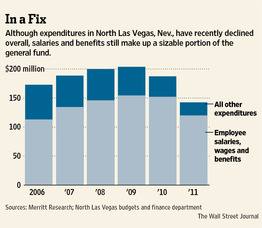By KELLY NOLAN
North Las Vegas is taking an unusual approach to combat growing labor costs, which consume more than 80% of its budget: The Nevada city has declared a state of emergency and suspended some terms of its contracts with unions for the fiscal year starting July 1.
As the city of 217,000 raced to propose a balanced budget by a June 1 deadline, it invoked a state law designed to cope with riots, natural disasters, military action or civil disorder to suspend raises and holiday pay for its police and fire unions.
"There is no [legal] precedent for using fiscal crisis in Nevada as a basis to suspend collective bargaining," said Ruben Garcia, a professor at the William S. Boyd School of Law at the University of Nevada, Las Vegas. He added that the argument has been tried—unsuccessfully—in states such as California, which also has a similar "emergency" law. "The city's emergency declaration seems to me to be the city's last resort to avoid having to bargain with the unions."
In the resolution for the emergency declaration, North Las Vegas officials said the only other way for the city to address its $30.9 million deficit—mass layoffs of public-safety workers—would create "a public-safety emergency."
City officials noted they had already tried to negotiate with their unions. "We wish it was an action we never had to take," city manager Tim Hacker said.
The city also looked at options such as privatizing its water and sewer utility, or selling and leasing back its city hall, but determined they wouldn't save enough money.
In a lawsuit challenging the move filed this month in Clark County District Court, the North Las Vegas Police Supervisors Association said the city's action was "based upon an illegal and factually baseless interpretation" of state law, resulting in "unilateral and unlawful interference, disruption and breach of its public safety labor agreements." A lawyer representing the union declined to comment further.
North Las Vegas employs 203 commissioned police officers and 151 firefighters. In a mass-layoff scenario, the city would cut about 30% of its police and 37% of its firefighter staff.
Based on its current level of public-safety employees, North Las Vegas seems understaffed, said Jeff Roemer, president of RW Management Group Inc., a public-safety consulting firm in Menasha, Wisc. By comparison, Green Bay, Wisc., with about half the population of North Las Vegas, has 210 police officers and 185 firefighters, he said.
Layoffs "certainly wouldn't help" North Las Vegas, he said, though he noted it would be hard to say how severe the city's situation would be without knowing more about its crime levels, response times and other details.
State and local governments around the U.S. have fought to rein in labor contracts, with varying degrees of success. An inability to wrest concessions from public employees was partially responsible for bankruptcy filings by Vallejo, Calif., in 2008 and Central Falls, R.I., last year. Facing similar financial issues, Stockton, Calif., filed a petition Thursday for Chapter 9 bankruptcy.
Just weeks ago, voters in two big California cities—San Jose and San Diego—approved measures to cut pension benefits for city employees, while the mayor of Providence, R.I., reached an agreement last month with workers and retirees to scale back pensions.
"This is not going to be the last time you hear of a situation where politicians…are trying to address the issue of entitlements, and they are using every avenue they can…to make cuts happen." said Matt Dalton, chief executive of Belle Haven Investments in White Plains, N.Y.
Mr. Dalton's firm doesn't own any North Las Vegas bonds.
According to Fitch Ratings, salaries and related benefits accounted for about 84% of North Las Vegas's general-fund expenditures in fiscal 2011. Typically, such costs make up about two-thirds of local government expenses, said Rich Raphael, who heads Fitch's public-finance department. He said North Las Vegas's fiscal situation was "one of the most severe" among local governments, especially because of its steep revenue declines after the housing bubble burst.
According to the city's website, property-tax revenue has declined 37.1% since 2009, to $39 million from $62 million. Tax revenue overall fell by 30% from a high of $54 million in 2006 to about $38 million in 2012.
Meanwhile, one of every 195 housing units in North Las Vegas in foreclosure, according to RealtyTrac; that is more than three times the national average. Unemployment remains a scourge: North Las Vegas's jobless rate was 14.3% in May, well above the national average of 8.2%.
Fitch and Moody's Investors Service have both cut ratings on North Las Vegas bonds this year, with Moody's saying earlier this month that another downgrade is possible in the months ahead. North Las Vegas has about $458 million of debt outstanding, Moody's said.
Mr. Hacker, the city manager, called the rating cuts "unfortunate," saying the city had a "stellar" record in meeting its debt obligations.
Write to Kelly Nolan at kelly.nolan@dowjones.com
A version of this article appeared June 29, 2012, on page A2 in the U.S. edition of The Wall Street Journal, with the headline: Nevada City Suspends Labor Pacts in Emergency.










![[image]](https://iza-server.uibk.ac.at/pywb/dilimag/20210113092156im_/http://si.wsj.net/public/resources/images/MK-BV397_SOCCER_A_20120701185645.jpg)
![[image]](https://iza-server.uibk.ac.at/pywb/dilimag/20210113092156im_/http://si.wsj.net/public/resources/images/AI-BT880_AUSIND_A_20120701142840.jpg)
![[image]](https://iza-server.uibk.ac.at/pywb/dilimag/20210113092156im_/http://si.wsj.net/public/resources/images/AI-BT878_JNUKE_A_20120701175727.jpg)
![[image]](https://iza-server.uibk.ac.at/pywb/dilimag/20210113092156im_/http://si.wsj.net/public/resources/images/P1-BG850_SCYTHE_C_20120629173254.jpg)
![[image]](https://iza-server.uibk.ac.at/pywb/dilimag/20210113092156im_/http://si.wsj.net/public/resources/images/OB-TO602_boxila_C_20120628203443.jpg)
![[OB-TO555_spidey_C_20120628175021.jpg]](https://iza-server.uibk.ac.at/pywb/dilimag/20210113092156im_/http://si.wsj.net/public/resources/images/OB-TO555_spidey_C_20120628175021.jpg)
![[image]](https://iza-server.uibk.ac.at/pywb/dilimag/20210113092156im_/http://si.wsj.net/public/resources/images/OD-AS358_CRUISE_C_20120628134552.jpg)
![[image]](https://iza-server.uibk.ac.at/pywb/dilimag/20210113092156im_/http://si.wsj.net/public/resources/images/RV-AH340_MASTER_C_20120628162030.jpg)








Most Recommended
“Try and fathom the hypocrisy of ...;”
“Perhaps, Mr Gensert, it's not th...;”
“Another thoughtful and concise...;”
“However, Ms Napolitano immediate...;”
“My thought, exactly...You go on...;”